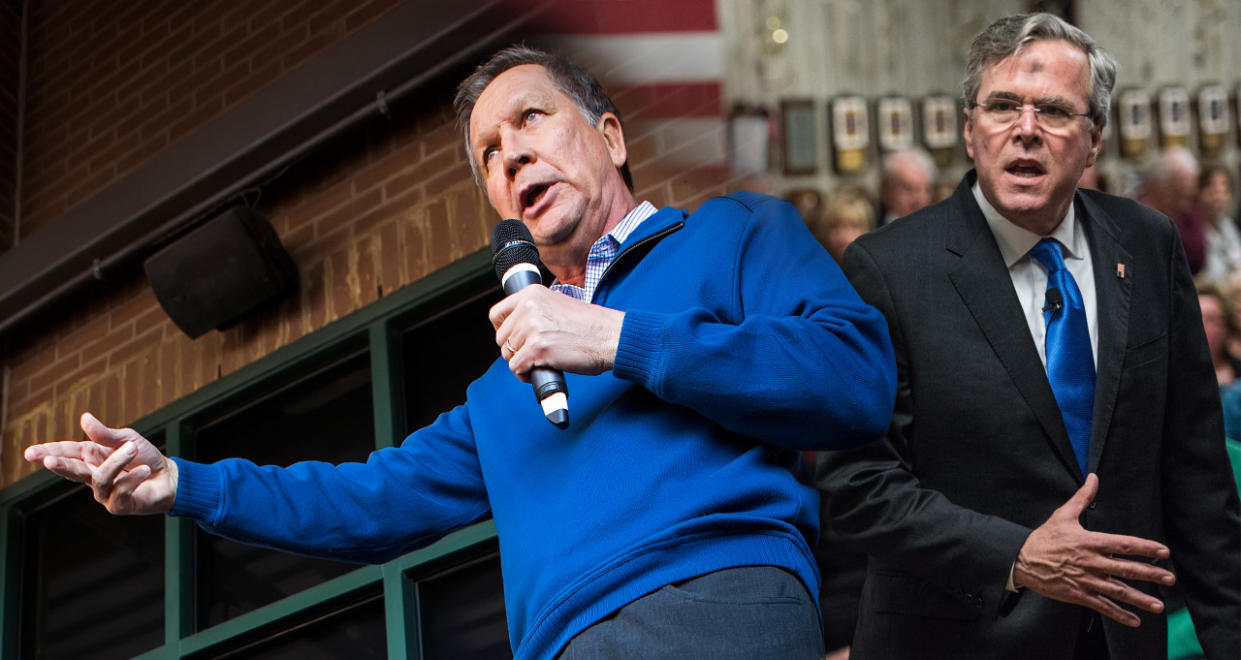Kasich super-PAC takes aim at Bush speaking fees

(Photo illustration: Yahoo News, photos: Alex Holt for the Washington Post via Getty Images, Sean Rayford/Getty Images)
John Kasich has vowed to stick with the positive message that helped him win second place in New Hampshire, but as Jeb Bush begins to criticize his record, a super-PAC supporting the Ohio governor says they are not bound by the same constraints.
“Given the declaration by Jeb’s campaign to go scorched earth and attack Gov. Kasich in South Carolina, we are prepared to fight back,” said Matt David of New Day for America, the super-PAC backing Kasich.
David criticized Bush for taking about $200,000 from five colleges in 2014, and said that “further undermines Jeb’s main rationale for his candidacy — that somehow or another, Bush can beat another Clinton.”
Paul Lindsay, a spokesman for Bush’s super-PAC, Right to Rise, shot back that “given his embrace of Obamacare expansion and support for the Clinton assault weapons ban, the only place where John Kasich belongs on a national ticket is as Hillary’s running mate.”
Former Secretary of State Hillary Clinton, who has been considered the Democratic frontrunner but lost New Hampshire to Sen. Bernie Sanders of Vermont, has been heavily criticized for charging fees of $200,000 to $300,000 to speak at colleges in recent years, even as those schools were facing budget crunches that forced them to raise tuition.
Bush’s fees were much smaller — between $40,000 and $45,000 — but also included first-class airfare and high-end accommodations that added thousands of dollars more. Federal forms obtained by New Day researchers showed that in 2014, Bush gave five speeches at universities or colleges that compensated him with payments and perks that totaled $212,500.
Clinton, by comparison, received around $1.8 million in income from eight schools in less than a year, starting in 2013, the Washington Post reported in 2014.
Even Chelsea Clinton, Hillary’s daughter, has received more per speech than Bush, charging as much as $75,000 for some appearances.
Bush’s overall speech earnings also paled in comparison to Clinton’s. He earned around $10 million from 250 speeches between 2007 and 2015, Bloomberg reported last year. Clinton and her husband, former President Bill Clinton, took in $153 million between 2001 and 2015, CNN reported last week.
Despite the vast difference between Clinton’s and Bush’s fees, David argued that if Bush were the nominee, he could not critique Clinton on the issue because he is “guilty of the same thing.”
But Lindsay, with the Bush super-PAC, noted that Kasich himself has earned big speaking fees in the past too. In 2008, Kasich collected $165,718 from speeches, the same year he made $590,000 in salary and bonuses while working as a managing director at Lehman Brothers.
Sanders, Clinton’s primary opponent, has focused much of his criticism on her paid speeches.
David, with the Kasich super-PAC, said Bush’s speaking fees for universities were “exorbitant,” and that Bush also received “Hillary-esque ‘celebrity’ style accommodations.”
The “celebrity” perks is a reference to an email between staffers at the University of North Texas, who in 2011 had a limo driver pick Bush up at the airport, and explained that the driver had to stay at the curb by the car instead of coming inside.
The limousine company “said this is what they do with celebrity’s [sic] and other high profile people,” the e-mail said.
Bush requested that the limo driver hold a sign that said, “John B.”
The last speech was in October 2014, two months before Bush announced he was exploring a run for president. Bush was paid $45,000 to speak at Vanderbilt University.
New Day is not running TV ads in South Carolina yet, though they say they have three that are ready to go if Bush’s campaign or his super-PAC goes on the air with TV ads attacking Kasich in the Palmetto State. Bush himself has already criticized Kasich for expanding Medicaid in Ohio and for advocating reductions in defense spending.
Kasich himself has not run negative ads, and has kept his campaign message focused largely on a positive message. But just as Bush’s campaign has released web videos criticizing Kasich’s record, Kasich has done the same to Bush.
Right to Rise has already spent almost $12 million on TV ads in South Carolina, about half of the total spending in the state by all the Republican presidential candidates and their outside groups.
The escalating war of words between Kasich and Bush, as well as between Bush and Sen. Marco Rubio, R-Fla. is frustrating Republican strategists whose main concern is that the party stop businessman Donald Trump from winning the party’s nomination.
“Kasich, Cruz, Bush, and Rubio must resist the temptation to go after one another — which only wastes vital time — and instead concentrate fire on Mr. Trump,” Karl Rove, former White House adviser to Bush’s older brother, President George W. Bush, wrote in the Wall Street Journal.
George W. Bush will campaign with his brother in North Charleston on Monday evening, and could level formidable criticism at Trump if he chooses.


